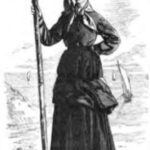Zheng He is a 15th-century Chinese admiral. Known for having commanded one of the largest fleets in history, his name is linked to a hypothesis, later denied, about the discovery of the Americas by the Chinese. He was born in 1371 in the Mongolian province of Yunnan, from a Muslim family. Ten years later the Chinese empire occupies the province, and young Zheng He is captured. He grows up at court as a royal eunuch. He is playmate and advisor to Prince Zhu Di, the future Yongle Emperor. In 1402 Yongle came to power. A period of political and cultural growth begins for the Ming dynasty. With the aim of extending China’s influence beyond its borders, Yongle has a massive imperial fleet built. Zheng He is named admiral.
At the command of about 300 ships, with 28 thousand men under his orders, he enters history for the 7 great oceanic expeditions that he leads between 1405 and 1433. The first three expeditions are intended to expand the Chinese sphere of influence in the basin of the Indian Ocean. Zheng He lands in Malaysia, India and Ceylon, now Sri Lanka. The admiral is distinguished by the skill with which he manages diplomatic relations, while not giving up more drastic means in case of difficulty. During the second expedition, he forcibly quells a revolt in Ceylon and takes Alagonakkara, king of the island, prisoner. With the fourth and fifth expeditions, Zheng He goes further west. He leads the fleet towards the Persian Gulf and Arabia, until it touches the coasts of East Africa.
After visiting Mecca, the crew arrives in present-day Kenya. In exchange for porcelain and silk, Zheng He brings specimens of zebras and giraffes home, as evidenced by drawings of the time. The sixth expedition is the best known. The imperial fleet leaves again for Arabia and Africa, to accompany the foreign emissaries back to their lands. Then he returns to China. However, there is another version of the story: in 2002, former British naval officer Gavin Menzies claims that Zheng He, circumnavigating Africa, landed in America before Christopher Columbus. The proof would be the discovery of a map of the time.
Collection: Images, Texts
Project: 9. Travels and travelers: economic, social and cultural connections.
Chronology: XIV
Scope: Primary, Secondary Education, Higher Education
Link: http://www.ovovideo.com/zheng-he/
Resource type: Video, Image, Text
Format: Images|Texts
Source: OVOVIDEO; BRITANNICA. Bibliografy studies:La Cina, a cura di M. Scarpari, II: L’età imperiale dai Tre Regni ai Qing, a cura di M. Sabattini, M. Scarpari, Einaudi, Torino 2010; M. S. Yamashita, G. Guadalupi, Zhen He: tracciare i viaggi epici del più grande esploratore della Cina, Edizioni White Star, Vercelli 2006; F. W. Mote, Cina imperiale 900-1800, Harvard University Press, Harvard 2003.
Language: Italian and English
Date: 1405 - 1433
Owner: Beatrice Borghi (Modernalia)
Copyright: Ovovide, Britannica
Abstract: In the footsteps of Alexander the Great and Marco Polo.
Tags





